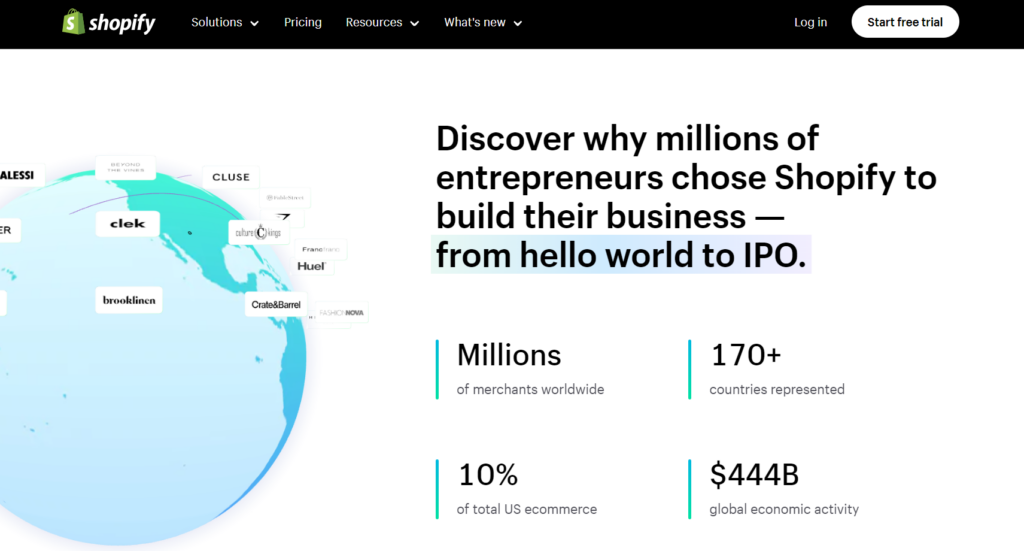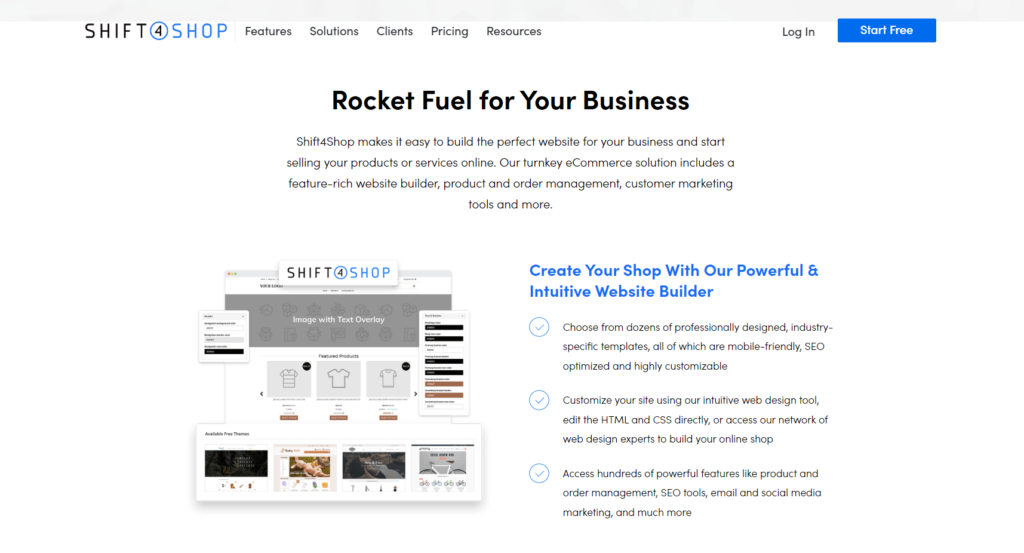Table of Contents
Our Verdict
When deciding between Shopify and Shift4Shop, choose Shopify if you want a robust, user-friendly platform with a vast app ecosystem and excellent customer support. Shopify excels with its intuitive interface, making it easy for beginners to set up and manage their online store. It offers numerous customizable themes and a comprehensive suite of tools to help you scale your business, whether you’re just starting or looking to grow.
On the other hand, Shift4Shop is a strong contender if you’re looking for a cost-effective solution with many built-in features. It offers a solid range of functionalities out of the box, including advanced SEO tools, and doesn’t charge transaction fees, which can be a significant advantage for smaller businesses or those with tighter margins.
However, if you prioritize ease of use, extensive third-party integrations, and top-notch support, Shopify often proves to be the superior choice. Its scalability and the sheer variety of available apps allow you to tailor your store precisely to your needs, which can be crucial for long-term growth. Weigh your specific needs and budget carefully, but remember that Shopify’s comprehensive offering often makes it the go-to choice for many entrepreneurs.
Why Choose Shopify

Who Shopify Is Best For
Shopify is best for you if you:
- Want to start an online store without needing extensive technical knowledge.
- Need a cost-effective and scalable solution for launching new businesses.
- Value seamless integration with dropshipping apps and suppliers.
- Prefer to sell handmade goods, art, or digital products.
- Want to enhance your online operations with advanced features and customization options.
- Need multi-channel sales.
Who Shopify Is Not Right For
Shopify may not be the ideal choice for you if you:
- Need extensive customizations or unique functionalities that are not easily achievable with Shopify’s app ecosystem or themes.
- Have extremely complex operations, extensive scalability needs, or specific regulatory compliance requirements.
- Require complete control over your hosting environment, server configurations, or codebase may prefer self-hosted solutions like WooCommerce or Magento.
- Focus on content publishing, such as blogs or media websites, you might find platforms like WordPress more suited due to their robust content management capabilities.
- Require highly specific requirements, such as healthcare or finance, you may find it challenging to adapt Shopify’s features to comply with industry regulations or standards without extensive customization.
Why Choose Shift4Shop

Who Is Shift4Shop Best For
Shift4Shop is best suited for you if you:
- Want to establish or grow your online presence without significant upfront costs.
- Need robust e-commerce features like inventory management, multiple payment gateways, and customizable storefronts.
- Prefer a high degree of customization for your online store, as Shift4Shop provides extensive design and functionality options.
- Need integration with various third-party services and tools, including shipping, marketing, and accounting software.
Who Shift4Shop Is Not Right For
Shift4Shop may not be the ideal choice for you if you:
- Have large enterprises with extremely complex needs or large-scale operations.
- Require highly specialized or custom-built features that aren’t supported by Shift4Shop’s platform.
- Prefer extensive control over backend code and server configurations might find Shift4Shop’s platform.
- Run a business that heavily relies on integration with multiple sales channels beyond traditional e-commerce (like extensive brick-and-mortar retail integration or complex API connections), Shift4Shop’s capabilities in these areas might not be as extensive as specialized solutions.
Main Differences
Ideal For
Shopify is a good fit for businesses that prioritize a user-friendly interface, a large app store for customization, strong design aesthetics, and a larger online community; it’s also well-suited if you have a physical store and want seamless integration with Shopify POS. In contrast, Shift4Shop is ideal for budget-conscious businesses that require many features included upfront without extensive app integrations, making it a good option for handling high transaction volumes and avoiding Shopify’s transaction fees.
Pricing
Shopify starts at $29/month for their Basic Shopify plan, with higher tiers offering more features and transaction volume capacity. However, Shopify charges additional transaction fees (0.5% to 2%) if you don’t use their payment gateway, Shopify Payments. On the other hand, Shift4Shop offers a free plan with basic features, and paid plans start at a lower cost than Shopify’s. It doesn’t charge transaction fees on any payment processor, so you only pay the standard processing fees.
Features
Shopify offers a user-friendly interface and a vast app store with thousands of add-ons to extend functionalities like marketing, accounting, and shipping. However, many essential features are only available in higher-tier plans. While Shift4Shop includes more features out-of-the-box in their base plans, including abandoned cart recovery, digital downloads, and a built-in blog. This can be cost-effective for users who don’t need extensive customization. However, their app store isn’t as large as Shopify’s.
Design
Shopify offers a smaller selection of themes but generally has a more modern and sleek design aesthetic. Many themes are industry-specific and cater to a wider range of business types. In contrast, Shift4Shop provides fewer themes overall, and some may lack functionalities like mobile editing.
Customer Support
Shopify has a well-regarded customer support system with 24/7 availability through various channels like phone, live chat, and email. They also benefit from a larger and more active online community for peer-to-peer help. While Shift4Shop offers 24/7 support as well, but their online community is smaller.
Integrations and Extensions
Shopify offers hundreds of third-party apps and themes available for customization, while Shift4Shop provides API integration and access to over 1000 third-party apps via Zapier.
Payment Processing and POS
Shift4Shop focuses on payment flexibility.
Shopify offers various marketing and SEO tools to promote and grow online stores.
In summary, Shopify is ideal for extensive growth and advanced ecommerce functionalities, while Shift4Shop prioritizes payment flexibility and product customization.
Ultimately, the best choice depends on your specific needs and budget. Consider what features are most important to you, how much customization you need, and the size of your business.
Standout Features
Shopify Standout Features
Scalability
Shopify plans cater to businesses of all sizes. You can start with a basic plan and seamlessly upgrade as your business grows, without needing to migrate to a completely new platform. This makes it a secure choice for ventures with future expansion plans.
Vast App Store
The Shopify App Store is a treasure trove for online businesses. It houses thousands of apps that extend Shopify’s functionalities in various aspects, including marketing, accounting, shipping, customer service, social media integration, and more. This allows you to tailor your store to your specific needs and preferences.
Seamless Integrations
Shopify integrates effortlessly with a wide range of popular business tools and services. This makes it easy to connect your store with your existing workflows and streamline your operations.
Abandoned Cart Recovery
This valuable feature helps capture sales that might otherwise be lost. Shopify allows you to send automated emails reminding customers about abandoned carts, nudging them to complete their purchases.
Omnichannel Selling
Shopify facilitates selling across multiple channels. You can integrate your online store with social media platforms like Facebook and Instagram, allowing customers to buy directly from your social media pages. This expands your reach and opens up new avenues for sales.
Secure Platform
Shopify takes security very seriously. It provides a Level 1 PCI DSS-compliant platform, ensuring your customers’ financial information is always protected. They also offer free SSL certificates on all plans, further encrypting data transmissions.
Reliable Hosting
Shopify takes care of hosting your online store, so you don’t have to worry about server maintenance or downtime. Its robust infrastructure ensures your store is always up and running smoothly, providing a seamless experience for your customers.
App Development
For businesses with very specific needs, Shopify offers an API and development tools to create custom apps that extend the platform’s functionalities even further.
Shift4Shop Features
Responsive Templates
Choose from over 100 SEO-optimized themes, each with built-in tools. Customize them easily using the drag-and-drop interface.
Unlimited Storage and Bandwidth
Benefit from unlimited storage and bandwidth, ensuring you never run out of space or capacity to store products and deliver content seamlessly without any concerns.
Unlimited Products
Sell an unlimited number of products with complete freedom, without any restrictions or limitations imposed on the quantity or variety of products you can offer for sale.
Free Reports
Generate comprehensive, free reports that allow you to monitor and analyze your business’s performance effectively, providing detailed insights crucial for informed decision-making and strategic planning.
POS Integration
Seamlessly connect with point-of-sale (POS) devices to facilitate in-person sales, ensuring smooth integration and compatibility for a cohesive retail experience across physical and digital storefronts.
Customization Options
Enjoy extensive customization options with full access to HTML, CSS, and JavaScript, allowing advanced modifications to tailor your platform precisely to your needs and preferences.
PRO TIPS >>> Is Shopify the Best Ecommerce Platform?
Pros and Cons of Shopify

Pros
- Simplifies e-commerce setup with user-friendly interfaces and easy customization.
- Supports a wide range of payment gateways, ensuring flexibility for transactions.
- Ensures reliable and secure hosting with excellent uptime and security features.
- Leverages built-in SEO and marketing tools to enhance online visibility and drive traffic.
- Benefits from 24/7 customer support, providing assistance whenever needed.
Cons
- Encounters transaction fees unless using Shopify Payments, which can increase costs.
- Faces limitations in customization compared to open-source platforms.
- Experiences higher costs as your business grows, especially with additional apps and plugins.
- Depends on external apps for advanced features, which may involve extra expenses.
- Manages content limitations with a less flexible blogging platform compared to specialized CMS options.
- Handles potential scalability issues for very large enterprises needing highly customized solutions.
Pros and Cons of Shift4Shop

Pros
- Offers a comprehensive set of features at no monthly cost for U.S. merchants using Shift4 Payments.
- Provides a wide range of built-in tools for SEO, marketing, and store management.
- Supports unlimited products and bandwidth, accommodating various business sizes.
- Includes multiple payment gateways, offering flexibility for customers.
- Integrates seamlessly with numerous third-party apps and services.
- Delivers customizable templates and design options to create a unique storefront.
- Ensures strong security features, including SSL certificates and PCI compliance.
Cons
- Imposes higher transaction fees for merchants not using Shift4 Payments.
- Presents a steeper learning curve compared to more user-friendly platforms.
- Offers limited customer support hours compared to competitors with 24/7 support.
- Faces occasional issues with software bugs and updates.
- Lacks the extensive app marketplace found in other e-commerce platforms like Shopify.
- Requires more manual effort for certain advanced customizations.
Customer Reviews
Customers generally appreciate Shopify for its ease of use, citing its intuitive interface and drag-and-drop functionality that make setting up an online store straightforward, even for beginners. The extensive app store is another highlight, offering over 5,000 apps that allow users to extend their store’s functionality in various ways, from SEO tools to marketing integrations. Shopify’s 24/7 customer support, available through phone, email, and live chat, is frequently praised, as is its scalability, making it suitable for both small startups and large enterprises. However, some users find the pricing to be on the higher side, particularly when including the cost of premium apps and themes. Additionally, the transaction fees for those not using Shopify Payments can be a drawback, and more extensive customizations often require knowledge of Shopify’s coding language.
On the other hand, customers commended Shift4Shop for its feature-rich offering, providing a wide range of tools including SEO, real-time shipping rates, and support for digital products and subscriptions across all plans. Its cost-effectiveness, especially with the free plan available for U.S. merchants using the Shift4 payment processor, is a notable advantage for small businesses. The platform’s security features, such as PCI certification, daily backups, and a 99.9% uptime guarantee, also receive positive feedback.
However, some users have experienced performance issues, such as slower site speeds and frequent unannounced updates since the rebranding from 3dcart to Shift4Shop, which have caused disruptions. Customer support has received mixed reviews, with some users reporting slow response times and unhelpful answers. Additionally, editing site content can be less intuitive compared to other platforms, and the platform is primarily geared toward U.S. merchants, which can be inconvenient for international users due to support hours and default settings.
GET SMARTER >>> Flywheel Hosting Service: Buy or Not?
Competitors
WooCommerce
This is a popular open-source platform that integrates seamlessly with WordPress. It’s known for its flexibility and extensive customization options, allowing businesses to fully control their online stores. While WooCommerce itself is free, users need to pay for hosting, domains, and any additional plugins they might need
Squarespace
Squarespace is popular for its visually appealing templates and intuitive drag-and-drop website builder, Squarespace is ideal for small to medium-sized businesses. It offers comprehensive eCommerce features, though it lacks some of the advanced capabilities found in Shopify.
Wix
A versatile website builder that caters well to small businesses and creatives. It offers a user-friendly interface with drag-and-drop editing, and while it has robust eCommerce tools, it’s generally more suited for businesses that also need a strong blogging or creative component.
BigCommerce
BigCommerce tailors this platform for large-volume sellers, offering advanced features such as sales tax handling and automated shipping. It scales effectively and suits businesses aiming to grow without switching platforms.
Ecwid
Ideal for businesses with existing websites, Ecwid offers a free plan and easy integration with platforms like WordPress, Wix, and Weebly. It supports multiple sales channels and is known for its quick setup and flexible design options.
Pro Tips
- Use built-in SEO tools to improve search engine rankings by optimizing product descriptions, titles, and meta tags.
- Integrate your store with social media accounts to easily share new products and promotions. Run targeted ads to reach a broader audience.
- Ensure your site is mobile-friendly. Test it on various devices to provide a seamless shopping experience for all users.
- Stay connected with your customers through newsletters, promotional offers, and personalized recommendations to keep them engaged.
- Regularly review performance metrics to identify trends and areas for improvement. Make data-driven decisions to enhance your store’s performance.
- Explore and integrate apps and plugins for advanced inventory management, customer reviews, marketing automation, and other functionalities to streamline operations and improve the customer experience.
- Ensure you provide excellent customer service. Use chatbots, FAQ sections, and responsive support channels to assist your customers promptly.
- Experiment with different website elements, such as layouts, call-to-action buttons, and product pages, to determine what works best for your audience.
- Simplify the checkout process to reduce cart abandonment rates. Offer multiple payment options and ensure the checkout process is quick and easy.
- Foster a community around your brand by encouraging customer reviews and engaging with customers on social media. Build loyalty through reward programs and personalized experiences.
Recap
Consider your specific requirements when choosing between Shopify and Shift4Shop. Shopify is perfect if you prioritize user-friendliness, a wide range of app integrations, and strong scalability, making it suitable for businesses of any size.
On the other hand, Shift4Shop provides extensive features at a lower price point, particularly advantageous for U.S. merchants utilizing the Shift4 payment processor, though it might face challenges with performance and support. Evaluate your budget, technical expertise, and feature needs to determine the platform that aligns best with your business objectives. Continuously experiment and optimize to maximize the benefits of either platform.







